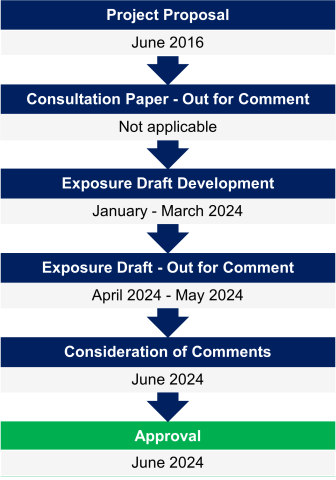CURRENT STATUS OF THE PROJECT
The IPSASB approved Concessionary Leases and Other Arrangements Conveying Rights over Assets (Amendments to IPSAS 43, IPSAS 47, and IPSAS 48). Amendments to IPSAS 43 and IPSAS 47 will be effective for periods on or after January 1, 2027. Earlier application is permitted.
In promulgating International Public Sector Accounting Standards (IPSASs), the International Public Sector Accounting Standards Board (IPSASB) adopts due process.
The IPSASB provides the Public Interest Committee (PIC) with documentation supporting the application of due process for all new or revised IPSASs before their release. The PIC’s consideration of due process may require the IPSASB to take further steps to address concerns regarding the application of due process, if raised. The PIC does not review or consider technical or financial reporting matters agreed by the IPSASB. Such decisions are the responsibility of the IPSASB.
The included Due Process Checklist provides evidence of the process followed:
PROJECT TIMELINE
The project timeline is depicted below. Please note that these are current targeted milestones/phases and may change as the work in this area progresses.

PROJECT OVERVIEW
Objective
The objective of this project is to develop additional guidance identifying and addressing lease-related accounting issues associated with lease-type arrangements.
Why the IPSASB Undertook this Project
After publishing IPSAS 43, Leases in January 2022, the IPSASB immediately began a second phase of the project to address public sector specific arrangements (concessionary leases, access rights, and other similar/‘lease-like’ arrangements).
Project Contact
Task Force
PUBLISHED DOCUMENTS AND SUPPORT
Documents in this section include:
- Major documents published by the IPSASB during the lifecycle of the project including: Consultation Papers, Exposure Drafts, issued IPSAS, amendments to IPSAS, and other similar due process documents;
- Supporting material related to each published document including: snapshots, webinars, and other material; and
- The project-relevant IPSASB agenda papers.
